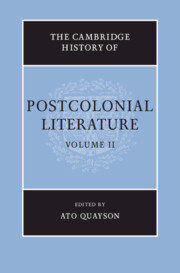Book contents
- Frontmatter
- 21 The language question in India and Africa
- 22 English and the development of postcolonial literature
- 23 Religion and postcolonial writing
- 24 Postcolonial responses to the Western canon
- 25 Island writing, Creole cultures
- 26 Magical realism
- 27 Palimpsest and hybridity in postcolonial writing
- 28 The narrative forms of postcolonial fiction
- 29 Poetry and postcolonialism
- 30 Primitivism and postcolonial literature
- 31 Popular culture and postcolonial literary production in Africa and India
- 32 Film and postcolonial writing
- 33 Fanon, Memmi, Glissant and postcolonial writing
- 34 Negritude and postcolonial literature
- 35 Publishing, prizes and postcolonial literary production
- 36 Key journals and organizations
- Bibliography
- Index
- References
29 - Poetry and postcolonialism
Published online by Cambridge University Press: 28 January 2012
- Frontmatter
- 21 The language question in India and Africa
- 22 English and the development of postcolonial literature
- 23 Religion and postcolonial writing
- 24 Postcolonial responses to the Western canon
- 25 Island writing, Creole cultures
- 26 Magical realism
- 27 Palimpsest and hybridity in postcolonial writing
- 28 The narrative forms of postcolonial fiction
- 29 Poetry and postcolonialism
- 30 Primitivism and postcolonial literature
- 31 Popular culture and postcolonial literary production in Africa and India
- 32 Film and postcolonial writing
- 33 Fanon, Memmi, Glissant and postcolonial writing
- 34 Negritude and postcolonial literature
- 35 Publishing, prizes and postcolonial literary production
- 36 Key journals and organizations
- Bibliography
- Index
- References
Summary
What is postcolonial poetry? How is it like or unlike the postcolonial novel, postcolonial theory, and other related genres? What paradigms are most fruitful for interpreting it? To approach these questions, a bald synopsis of models for the analysis of, and recurrent themes within, postcolonial poetry may be a useful place to begin, before embarking on a more extended discussion of postcolonial poetry in the context of other genres with which it fuses, and against which its specificities can be tracked. For the purposes of this chapter, ‘postcolonial poetry’ means poetry written by non-European peoples in the shadow of colonialism, both after independence and in the immediate period leading up to it, particularly works that engage, however obliquely, issues of living in the interstices between Western colonialism and non-European cultures.
Decolonization has been a primary paradigm for conceptualizing postcolonial poetry, as made possible by critical works such as Edward Said’s Orientalism (1978) and Culture and Imperialism (1993), Chinweizu, Onwuchekwu Jemie and Ihechukwu Madibuike’s Toward the Decolonization of African Literature (1980), Kamau Brathwaite‘s History of the Voice (1984), and Robert Young’s Postcolonialism (2001). Decolonization movements swept across much of Asia, Africa, Oceania, the Caribbean and elsewhere, particularly from the time of Indian and Pakistani independence in 1947 through the 1970s, the period when British, French, Belgian, Portuguese, Italian, Spanish and other modern European colonial powers relinquished control over most of the earth’s surface.
- Type
- Chapter
- Information
- The Cambridge History of Postcolonial Literature , pp. 938 - 981Publisher: Cambridge University PressPrint publication year: 2012
References
- 1
- Cited by



